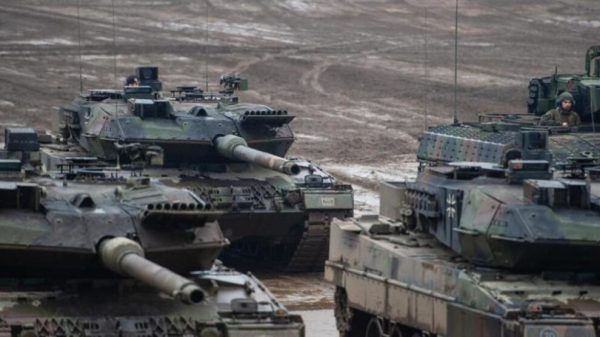Defining militarism as the most advanced anti-society monopolism, Öcalan writes: “The military has always been the power that has penetrated, controlled, and subjugated society regardless of the form of the state, but it reached its apex in the era of the middle class (bourgeois) and under nation-state monopoly.”
With “Sociology of Freedom”, the third volume of the “Manifesto of Democratic Civilisation”, Abdullah Öcalan presents his method for solving the most pressing problems of the 21st century. The ideas and concepts in it make important contributions to the global debate on a new socialism. For the Kurdish freedom movement, the perspectives developed in it are not just an abstract theory, but have a decisive influence on its politics and programme. Today, it advocates the idea of a democratic socialism beyond state and power. In the fourth chapter of the book, Öcalan deals with the emergence of the so-called social question. In it, he analyses a total of twelve different interwoven problems of society: from power and the state, to ecology, to the question of democracy. With the war in Ukraine, the question of militarism and anti-militarism is again a topical issue internationally.
Defining militarism as the most advanced anti-society monopolism, Öcalan writes: “The military has always been the power that has penetrated, controlled, and subjugated society regardless of the form of the state, but it reached its apex in the era of the middle class (bourgeois) and under nation-state monopoly.” The militarisation trends in Europe, the Middle East, but also between the US and China confirm this observation. The withdrawal and cancellation from historic disarmament treaties by the USA and Russia in recent years are an expression of this global trend. Europe, which has been arming itself against Russia for years, has also recorded the highest rates of increase in arms imports worldwide.[1]
In this context, we publish an excerpt on society’s militarism problem:
Militarism is the most advanced form of antisocial monopolism. It is not unrealistic to assume that the initial effort to establish authority over social nature to oppress and exploit people was the result of the analytical thought and action of a “crafty strongman” from a hunting tradition. Essentially, he attempted to establish his authority over two key groups: the hunters at his side and the women he was trying to confine to the home. Along the way, as shamans (proto-priests) and gerontocratic elements (groups of elders) joined the crafty strongman, the first hierarchical authority was formed in many societies in various forms. With the transition to civilization, the crafty strongman, and his entourage—now the official power—institutionalized themselves as the military arm of the state (the initial monopoly of the economy based on the usurpation of surplus product). The three successive dynasties of Ur that followed in the immediate wake of the priest-king period of Sumerian society reflect this development, and many other communities had parallel experiences. In the Epic of Gilgamesh, it is possible to follow step-by- tep the way the kingdom was clearly detached from the goddess Inanna tradition (the tradition of goddess-priestesses) and the way priestesses were weakened and confined to houses (both public and private).
If we see Gilgamesh as symbolic of the first commander in history, we can better analyze the rise of the militarist tradition. This tradition’s task was to hunt down people to meet the city’s need for slaves. With the help of the collaborationist Enkidu, who is mentioned in the Epic of Gilgamesh, they hunted the so-called wild barbarian tribes (practitioners of the Humbaba religion) living in the north of present-day Iraq. It is obvious that the tyranny of the city was the real source of barbarism and savagery. The word “barbaric” in the Greek cultural tradition was developed by the city as diversionary propaganda and a lie to establish ideological superiority. The rural tribes, which were weak and disorganized compared to the city, could not have been barbaric in the sense that official society claimed. The concept of barbarism is one of the most important diversionary lies in the history of civilization. The second task of the town bully was “security.” To this end, the most common method was to erect castles and ramparts and develop ever more powerful and deadly weapons. To do so, millions of people were enslaved, turned into serfs, or proletarianized, with those who did not accept their new status being killed, and, undeniably, all of this has been mirrored as history to us.
In keeping with its power, the military appropriated for itself the largest share of the economic value extorted, as is clear from the many historical expeditions with no other purpose than plundering. Furthermore, property was the basis of the state, and military conquest and seizure was clearly the source of property. Whoever conquered it owned it, declaring this to be a natural and inalienable right. It is the sum of property (especially land) and plunder (transportable possessions) that has been conquered and seized by the forces of power and the state. The principle that “all Ottoman land and people are the sultan’s,” for example, is nothing other than the continuation of this foundational tradition concerning the relationship between the state and military expeditions. Tradition was established in this way and sanctioned in every newly built state. This is why the military sees itself as the true custodian of the state, and, thus, of property. And, in defining itself as such, it takes this historical tradition into consideration. The fact that it is the strongest arm of the monopoly accords with the nature of power and the state. Indeed, the humanpower and weaponry it possessed was sufficient to achieve its goals. In this light, the fact that military coups are the response to the occasional efforts of the civil bureaucracy to increase its share of the monopoly is hardly surprising. The role of ideological and bureaucratic monopolies, also called the ilmiye and kalemiye classes,[2] in the establishment of power and the state was unquestionably indispensable but not as decisive as the role of the military. Even the most superficial examination of past and present power and state apparatuses confirms this.
First, what really matters for our purposes is that the military is the most advanced and decisive monopoly. The soldier and the army are not a source of glory, honor, and heroism (this is ideological propaganda meant to mask and distort the essence of things) but are an essential element of the monopoly of power. Their essence is economic. The army relies on the economy. It positions itself over it and at a distance from it, but, at the same time, takes the steps necessary to guarantee its income (salary) above all else. It is the monopoly sector that is the most difficult to oppose and the one that all other segments of the monopoly must compromise and share surplus value with, a practice that has an extensive historical basis and is, as such, a deep-rooted institutional tradition. In essence, it is the monopoly of the class (bureaucracy) that is most closely interested in economic development, but feels the most pressing need to keep its distance. To achieve this, it projects an image of itself as the power that is most remote from society, while in reality it is the monopolistic sector that has equipped itself with the most advanced economic and military weapons. Without a correct analysis of the military, we can neither fully understand what economic monopolism or power and state monopolisms are. The three of them comprise a whole. They feed on the same substance; the surplus values of society. In exchange they claim that they take care of society’s security, education, health, and productivity. This is how statism—the ideological state—presents itself. But this is not the truth; the truth is as we just described it.
The military is the most sharply organized arm of capital and power. Thus, it follows that it is the institution that ultimately subjugates and cages society. The military has always been the power that has penetrated, controlled, and subjugated society regardless of the form of the state, but it reached its apex in the era of the middle class (bourgeois) and under nation-state monopoly. The defining characteristic of the nation-state is that in the name of creating an official army the rest of society was officially disarmed and the monopoly on arms was transferred to the state and the army. At no time in history was society as disarmed as it has been under bourgeois rule. The reason for this extremely important development is the intensification of exploitation and the resultant rise of far-reaching resistance. Society cannot be ruled if it is not thoroughly and continuously disarmed, opened up to the infiltration of power, and subjected to constant surveillance. Society cannot be dealt with unless it is confined in the “iron cage” of modernity.[3] In addition, society cannot be ruled if it is not confined and besieged by the media army of the global monopolistic financial age. Formation of the ideological-media monopolies, as well the bureaucratic-military monopolies, replicates the aspects of exploitation monopolies. Not only are they inseparably bound together, they also condition each other. The most recent major central civilization, the super hegemon, together with other regional hegemons, including all of their local collaborators, is based on militarism and a gigantic arms industry, both above and within society. The priority given to this monopoly over any other stems from its historical and current position. In this light, identification of militarism with the fascism of capitalist monopoly makes perfect sense.
Of course, during the era of natural society and throughout written history various forms of society have engaged in wholesale self-defense against the militarist evolution of civilization, developing a variety of forms of resistance and engaging in numerous uprisings, participating in institutionalized guerrilla and people’s defense armies, and waging great defensive wars, all based on a tradition of self-defense. Of course, defensive wars and militarist monopoly wars are not equivalent. There is a difference in both quality and essence. While one is anti-society, colonialist, corrupting, and destructive, the other favors and protects society and strives to free society’s moral and political capacity. Democratic civilization protects and defends society, engaging in systematic self-defense against the central civilization’s militarism.
According to a recent report by the Stockholm-based research institute SIPRI, imports of defence equipment in Europe increased by 19 per cent in the five-year period from 2017 to 2021 compared to the period from 2012 to 2016 – more than on any other continent. The cause, SIPRI notes, was the arms build-up against Russia.”
There were four institutions within the Ottoman Empire state structure. The function of the ilmiye was to propagate the Muslim religion, while the kalemiye was administrative.
Max Weber has used the term stahlhartes Gehäuse (hardened steel casing), translated as “iron cage,” to escribe the increased rationalization inherent in social life; Max Weber, The Protestant Ethic and the Spirit f Capitalism (Mineola, NY: Dover Publications, 2003).

